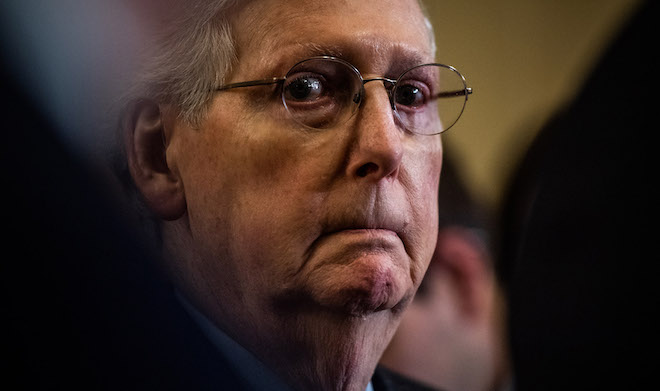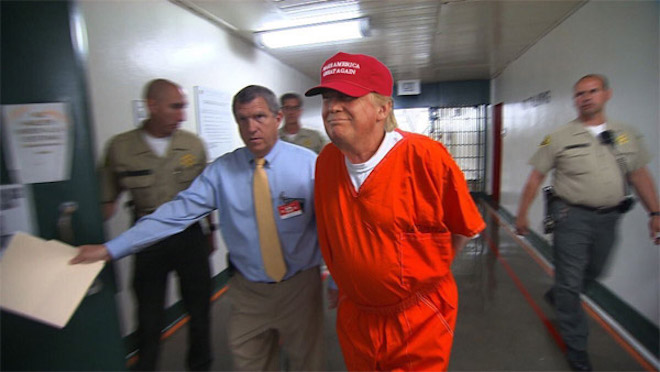Post-election prospects
Still an enormous number of hypnotised chooks in America ... What's on the cooker till January 20 ... The prospects of plunder during the interregnum ... The presidency as a private financial asset ... Republican judicial mischief ahead ... Corporate prosecutions on easy terms before the Democrats take over ... Roger Fitch in Washington rakes over the ruins
"Shared psychosis or folie à millions has been well-documented ... contagion of symptoms dissipates when exposure to the primary person is reduced, which is why Donald Trump holds rallies like his life depended on them ... It is also the reason why he cannot leave the presidency - in addition to the possibility of prosecution" -
Yale psychiatrist.
"Never before in US history has a president done such lasting damage to the fabric of American democracy in such a short amount of time ... The Mess Created By Trump Will Be with Us for Years." -
Der Spiegel
 The long-fought election campaign is over, with America's unconventional president breaking laws to the last, even flouting federal court orders to process postal ballots.
The long-fought election campaign is over, with America's unconventional president breaking laws to the last, even flouting federal court orders to process postal ballots.
Despite predictions, the expected buyers' remorse among 2016 Donald Trump voters didn't happen, and more Americans than previously suspected were outed as Trump-supporters, arguably a case of mass psychosis or, as an Australian might say, hypnotised chooks.
Even so, after four years of daylight robbery accompanied by oafish belligerence and bad manners, the president has been expelled, not by congress, but by voters, after his party spent $20 million on 300 lawsuits to deter them from voting.
The initial election results favouring Joe Biden were predictably contested, using the game plan from the Republicans' notorious 2000 election-theft. As in the 2000 "Brooks Brothers Riot", a Republican rabble besieged vote-counting centres, now in Pennsylvania, Michigan and Arizona rather than Florida.
The strategy was the same: harass election authorities into pausing the count (preferably while you're ahead), and then invent a pretext to go to federal court.
It's not likely to succeed, and the New Republic found the attempt farcical, but one law prof took it seriously.
After four long days of counting, the media (of all people) declared Joe Biden Jr the winner, but the incumbent persisted in election litigation, attacking (as expected) the ballots in states with Democrat governors but Republican legislatures, e.g. Pennsylvania, where Trump's lawyers were encouraged by helpful hints from conservative justices, especially Brett Kavanaugh.
Even so, absent supreme court intervention, come January 20th, America's comprehensively-crooked president will be removed (perhaps forcefully) from the principal crime scene, and could even face jail, more here. Some think he's a flight risk, like other autocrats who lose elections.
Sadly, Mr Trump will not be taking the Republican senate with him, as Democrats netted only one of the three senators they need to take control, although January runoffs in Georgia could result in two more. Without the senate, the Democratic house's election-law reforms, designed to avoid future chaos such as that in 2020, are doomed.
Real judicial reform, more here and here will also be off the table, and with a newly-minted two-thirds supreme court majority, Republicans can move on from executive power to judicial mischief.
Americans must now endure, instead of a corrupt Republican administration, a Republican-subservient supreme court, bolstered by the alarming addition of the party loyalist Amy Coney Barrett, the first justice in 151 years to be confirmed without bipartisan support.
 McConnell: the courts are ours
McConnell: the courts are ours
Judicial appointments are already paying off in the lower courts: Trump has "flipped" four of the 12 regional judicial circuits - the 2nd, 3rd, 11th and crucially, the 9th. US senate majority leader Mitch McConnell gloated about stacking the courts:
"A lot of what we've done over the last four years will be undone sooner or later by the next election [but] ... They won't be able to do much about this for a long time to come."
• • •
While it lasted, and for those who could afford to invest in it, the Republicans ran the best government money could buy. For Trump personally, it may have been his most lucrative hustle: he had wonderful, cost-free benefits to exchange and unlimited government assets to exploit, including valuable intangible assets such as drilling permits and military wireless spectra.
Trump's outraged reaction to his election loss suggests he regards the presidency itself as a financial asset, not unlike casino permits, a sort of quadrennial looting licence whose renewal has been unfairly withheld.
If only the president would now withdraw gracefully, as he did in 1987 after missing out (due to mafia connections) on Sydney's Darling Harbour casino.
• • •
From now until January 20, Trump will see how much damage he can inflict during the "lameduck" interregnum, assisted by his scandal-plagued cabinet and 15 senior officials who hold positions illegally. As administration shredders run hot, incoming Democrats will focus on preserving official documents.
With his last 100 days underway, the administration has turned to time-honoured transition manoeuvres: e.g. poison pills (literally) and scorched-earth tactics, more here.
Public lands will be practically given away, while corporate-designed and drafted regulations are forced into effect by government agencies captured by those they regulate.
Corporate prosecutions are being settled on bargain terms. Just as the departing Obama rushed to settle his government's Deutsche Bank case before the bank's most problematic debtor could scuttle it, the outgoing Trump hopes to hobble legal options for the incoming Biden administration.

Republican governments often make sweetheart settlements with corporate defendants in lawsuits brought by Democratic administrations, witness the astonishing Tobacco case write-down from $130 billion to $10 billion in 2005, a record of government corruption that may never be equalled.
Robert McCallum, the Justice Department fixer who ordered a settlement contrary to that reached by career prosecutors, was modestly rewarded, as US Ambassador to Australia.
Currently, there is litigation involving pharmaceutical companies who pushed opioids, resulting in a health epidemic in which some 450,000 people died, and the Trump administration is desperate to settle the cases against the ringleader, Purdue Pharma, before Democrats and their plaintiffs' lawyers take over.
Purdue's owners, the Sackler family, having had ample time to pay themselves retained earnings, put the company into bankruptcy; now, they're eager to settle the case, before a less corporate-friendly government takes office.
The proposed bankruptcy settlement - subject to court approval - is predictably generous, protecting the extensive Sackler clan from any personal responsibility, and affecting lawsuits filed against the Sacklers and their company by state and local governments.
The proposed settlement suits Republicans: it deprives the mostly-Democratic states, cities and tribes of the level of compensation they anticipated.
• • •
Many fear that the greedy and indiscreet ex-president could be a security threat. Giving Donald Trump confidential briefings after he's out of office doesn't bear thinking about; just imagine his profiting-making schemes for government information.
One is reminded of Edward VIII's post-abdication behaviour, when the ex-king, briefed on war efforts, afterwards compromised Allied military secrets.
The British government had a simple solution: a distant vice-regal posting.
But what to do with Donald Trump?
You couldn't trust him with the Bahamas.
Roger Fitch is Justinian's man in Washington
No comments:
Post a Comment